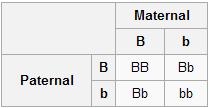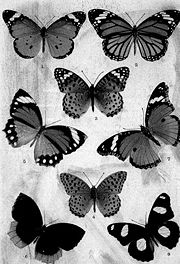
Reginald Punnett
Encyclopedia
Professor Reginald Crundall Punnett FRS (20 June 1875 – 3 January 1967) was a British
United Kingdom
The United Kingdom of Great Britain and Northern IrelandIn the United Kingdom and Dependencies, other languages have been officially recognised as legitimate autochthonous languages under the European Charter for Regional or Minority Languages...
geneticist
Genetics
Genetics , a discipline of biology, is the science of genes, heredity, and variation in living organisms....
who co-founded, with William Bateson
William Bateson
William Bateson was an English geneticist and a Fellow of St. John's College, Cambridge...
, the Journal of Genetics
Journal of Genetics
The Journal of Genetics is a peer-reviewed scientific journal in the field of genetics and evolution. It was founded in 1910 by the British geneticists William Bateson and Reginald Punnett and is one of the oldest genetics journals. It was later edited by J.B.S...
in 1910. Punnett is probably best remembered today as the creator of the Punnett square
Punnett square
The Punnett square is a diagram that is used to predict an outcome of a particular cross or breeding experiment. It is named after Reginald C. Punnett, who devised the approach, and is used by biologists to determine the probability of an offspring's having a particular genotype...
, a tool still used by biologists
Biology
Biology is a natural science concerned with the study of life and living organisms, including their structure, function, growth, origin, evolution, distribution, and taxonomy. Biology is a vast subject containing many subdivisions, topics, and disciplines...
to predict the probability
Probability
Probability is ordinarily used to describe an attitude of mind towards some proposition of whose truth we arenot certain. The proposition of interest is usually of the form "Will a specific event occur?" The attitude of mind is of the form "How certain are we that the event will occur?" The...
of possible genotype
Genotype
The genotype is the genetic makeup of a cell, an organism, or an individual usually with reference to a specific character under consideration...
s of offspring. His Mendelism (1905) is sometimes said to have been the first textbook on genetics; it was probably the first popular science
Popular science
Popular science, sometimes called literature of science, is interpretation of science intended for a general audience. While science journalism focuses on recent scientific developments, popular science is broad-ranging, often written by scientists as well as journalists, and is presented in many...
book to introduce genetics to the public.
Life and work
Reginald Crundall Punnett was born in 1875 in the town of Tonbridge in Kent, England...(http://tonbridgedaily.blogspot.com/)3 April 1881 Census.
Name:
Reginald C. Pannett (Incorrect transcription)
[Reginald C. Punnett].
Age:5..
Estimated Birth Year:abt 1876..
Relation:Son..
Father's name:George Punnett..
Mother's name:Emily Jane Punnett..
Where born: Tunbridge, Kent, England..
Street Address: Dry Hill Park. (Parkside) The Firs..
Household Members:
George Punnett 37. Builder.
Emily Jane Punnett 30.
Reginald C. Punnett 5.
Hubert G.C. Punnett 4.
Rose K.C. Punnett 1.
Catherine M.C. Day 3 Niece. (Farmer's daughter)
Emily Ann Coppin 26. Cook
Emily Rose Rye 19. Housekeeper.
Catherine J. Bridger 21. Nurse.
While recovering from a childhood bout of appendicitis, Punnett became acquainted with Jardine's Naturalist's Library and developed an interest in natural history. Punnett was educated at Clifton College
Clifton College
Clifton College is a co-educational independent school in Clifton, Bristol, England, founded in 1862. In its early years it was notable for emphasising science in the curriculum, and for being less concerned with social elitism, e.g. by admitting day-boys on equal terms and providing a dedicated...
.
5 April 1891 Census shows him as a pupil at Clifton College, Bristol, England, aged 15
Attending Gonville and Caius College at the University of Cambridge
University of Cambridge
The University of Cambridge is a public research university located in Cambridge, United Kingdom. It is the second-oldest university in both the United Kingdom and the English-speaking world , and the seventh-oldest globally...
, Punnett earned a degree in zoology in 1898, and a masters in 1902. Between these degrees he worked as a demonstrator and part-time lecturer at the University of St. Andrew's Natural History Department...
31 March 1901 Census
Reginald Crundall Punnett
Age:26.
Estimated Birth Year abt 1875.
Relationship:Boarder.
Where born:Tonbridge, Kent, England.
Address 83 North Street.FIFE.Scotland.
Occupation:Lethuel In Zoology...
Household Members:
Agnes Helen Provan 38.
William Provan 36.
Lizzie Neven 16.
William Harrison Theesher 23.
Edward Kynorton Williams 23.
Reginald Crundall Punnett 26...
However, by 1902 Punnett was back at Cambridge working in zoology, primarily the study of worms, specifically nemerteans. It was during this time that he and William Bateson began a research collaboration, which lasted several years.

Gregor Mendel
Gregor Johann Mendel was an Austrian scientist and Augustinian friar who gained posthumous fame as the founder of the new science of genetics. Mendel demonstrated that the inheritance of certain traits in pea plants follows particular patterns, now referred to as the laws of Mendelian inheritance...
work on inheritance was largely unknown and unappreciated by scientists. However, in 1900, Mendel's work was rediscovered by Carl Correns
Carl Correns
Carl Erich Correns was a German botanist and geneticist, who is notable primarily for his independent discovery of the principles of heredity, and for his rediscovery of Gregor Mendel's earlier paper on that subject, which he achieved simultaneously but independently of the botanists Erich...
, Erich Tschermak von Seysenegg and Hugo de Vries
Hugo de Vries
Hugo Marie de Vries ForMemRS was a Dutch botanist and one of the first geneticists. He is known chiefly for suggesting the concept of genes, rediscovering the laws of heredity in the 1890s while unaware of Gregor Mendel's work, for introducing the term "mutation", and for developing a mutation...
. William Bateson became a proponent of Mendelian genetics, and had Mendel's work translated into English. It was with Bateson that Reginald Punnett helped established the new science
Science
Science is a systematic enterprise that builds and organizes knowledge in the form of testable explanations and predictions about the universe...
of genetics at Cambridge. He and Bateson co-discovered genetic linkage
Genetic linkage
Genetic linkage is the tendency of certain loci or alleles to be inherited together. Genetic loci that are physically close to one another on the same chromosome tend to stay together during meiosis, and are thus genetically linked.-Background:...
through experiments with chickens and pea plants.
In 1908, unable to explain how a dominant gene would not become fixed and ubiquitous in a population, Punnett introduced one of his problems to the mathematician G. H. Hardy
G. H. Hardy
Godfrey Harold “G. H.” Hardy FRS was a prominent English mathematician, known for his achievements in number theory and mathematical analysis....
, with whom he played cricket
Cricket
Cricket is a bat-and-ball game played between two teams of 11 players on an oval-shaped field, at the centre of which is a rectangular 22-yard long pitch. One team bats, trying to score as many runs as possible while the other team bowls and fields, trying to dismiss the batsmen and thus limit the...
. Hardy went on to formulate the Hardy-Weinberg principle
Hardy-Weinberg principle
The Hardy–Weinberg principle states that both allele and genotype frequencies in a population remain constant—that is, they are in equilibrium—from generation to generation unless specific disturbing influences are introduced...
, independently of the German Wilhelm Weinberg
Wilhelm Weinberg
Dr Wilhelm Weinberg was a German half-Jewish physician and obstetrician-gynecologist, practicing in Stuttgart, who in a 1908 paper Dr Wilhelm Weinberg (Stuttgart, December 25, 1862 – Tübingen, November 27, 1937) was a German half-Jewish physician and obstetrician-gynecologist, practicing in...
.
In 1910 Punnett became professor of biology at Cambridge, and then the first Arthur Balfour Professor of Genetics
Arthur Balfour Professor of Genetics
The Arthur Balfour Professorship of Genetics is one of the senior professorships in genetics at the University of Cambridge, founded in 1912.The chair was endowed by Reginald Baliol Brett, 2nd Viscount Esher, according to whom the money was "placed in [his] hands" by an anonymous benefactor...
when Bateson left in 1912. In the same year, Punnett was elected a Fellow
Fellow
A fellow in the broadest sense is someone who is an equal or a comrade. The term fellow is also used to describe a person, particularly by those in the upper social classes. It is most often used in an academic context: a fellow is often part of an elite group of learned people who are awarded...
of the Royal Society
Royal Society
The Royal Society of London for Improving Natural Knowledge, known simply as the Royal Society, is a learned society for science, and is possibly the oldest such society in existence. Founded in November 1660, it was granted a Royal Charter by King Charles II as the "Royal Society of London"...
. He received the society's Darwin Medal
Darwin Medal
The Darwin Medal is awarded by the Royal Society every alternate year for "work of acknowledged distinction in the broad area of biology in which Charles Darwin worked, notably in evolution, population biology, organismal biology and biological diversity". First awarded in 1890, it was created in...
in 1922.
2 April 1911 Census shows him boarding at a private house, 2+3 Hertford Street. Mayfair. Westminster. London...He is 35, single and a Professor of Biology.
During World War I, Punnett successfully applied his expertise to the problem of the early determination of gender in chicken
Chicken
The chicken is a domesticated fowl, a subspecies of the Red Junglefowl. As one of the most common and widespread domestic animals, and with a population of more than 24 billion in 2003, there are more chickens in the world than any other species of bird...
s. Since only females were used for egg-production, early identification of male chicks, which were destroyed or separated for fattening, meant that limited animal-feed and other resources could be used more efficiently. Punnett's work in this area was summarized in Heredity in Poultry (1923).
Reginald Punnett retired in 1940, and died at the age of 91 in 1967 in Bilbrook, Somerset
Somerset
The ceremonial and non-metropolitan county of Somerset in South West England borders Bristol and Gloucestershire to the north, Wiltshire to the east, Dorset to the south-east, and Devon to the south-west. It is partly bounded to the north and west by the Bristol Channel and the estuary of the...
.
Selected writings


